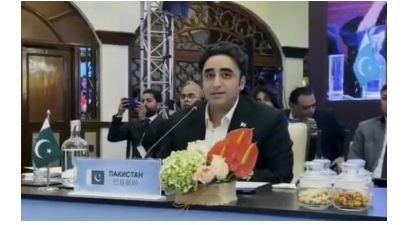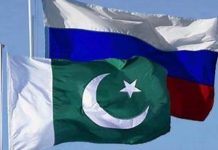GOA, MAY 5: Foreign Minister Bilawal Bhutto-Zardari used his address to the Shanghai Cooperation Organisation’s (SCO) Council of Foreign Ministers (CFM) on Friday to urge member nations to refrain from using terrorism as a diplomatic tool.
Speaking on the second day of his visit to India, the foreign minister emphasised the importance of greater cooperation among SCO countries in tackling terrorism, calling for joint efforts to address the root causes of the issue.
“The collective security of our peoples is our joint responsibility. […] Let’s not get caught up in weaponising terrorism for diplomatic point scoring,” the Foreign Office (FO) quoted Bilawal as saying.
Earlier, Indian Minister of External Affairs S. Jaishankar addressed the SCO meeting, in which he highlighted the issue of cross-border terrorism.
According to the Hindustan Times, Jaishankar said: “While the world was engaged in facing Covid and its consequences, the menace of terrorism continues unabated. Taking our eyes off this menace would be detrimental to our security interests.
“We firmly believe that there can be no justification for terrorism and it must be stopped in all its forms and manifestations, including cross-border terrorism,” Jaishankar said.
He further called for the “channel of activities for terrorist activities” to be “seized and blocked without distinction”.
The Indian news agency quoted the minister as saying, “Members need not be reminded that combating terrorism is one of the original mandates of the SCO.”
Jaishankar noted that the unfolding situation in Afghanistan following the Taliban’s return to power “remains at the centre of our attention”, adding that the efforts should be directed towards the welfare of the Afghan people, the Hindustan Times said.
Bilawal’s address also touched upon the issue of terrorism and Islamabad’s commitment to Afghanistan.
The FO, in a Twitter thread, quoted Bilawal as saying, “Unilateral and illegal measures by states in violation of international law and Security Council resolutions run counter to the SCO objectives”.
“When great powers play the role of peacemaker, we can unlock the potential of peace while paving the way for greater cooperation, regional integration and economic opportunities for our peoples,” he added.
Bilawal also stressed upon the SCO’s importance for Pakistan: “There couldn’t be a more powerful indication of the importance that Pakistan attaches to the SCO than my presence here in Goa for this CFM.”
The minister asserted the SCO could be a “key platform for taking the vision of Eurasian connectivity to the next level”, the FO said.
The FO further quoted him reiterating Pakistan’s belief and adherence to the “principles of mutual trust, equality, respect for cultural diversity, and the pursuit of shared development enshrined in the original ‘Shanghai Spirit’”.
The minister asserted Pakistan’s commitment to multilateralism and said it “continues to play a leading role at all international forums”.
Speaking on Afghanistan, Bilawal said, “A peaceful and stable Afghanistan is a key not only to regional integration and economic cooperation but also to global peace and stability.”
Citing Pakistan’s proposal to establish the Special Working Group on Poverty Alleviation, Bilawal advocated for closer cooperation for poverty alleviation under the SCO, the FO said.
The foreign minister once again highlighted Pakistan’s role in the global discourse on climate change. He further said, “The climate crisis poses an existential threat to humanity.”
He further highlighted the SCO’s role as an intergovernmental organisation and said the platform had promoted “mutual understanding, security and development through constructive and mutually beneficial cooperation”.
Earlier today, the FO shared a group photo of the foreign ministers attending the SCO meeting today. The SCO comprises eight member states — Pakistan, India, China, Russia, Tajikistan, Uzbekistan, Kazakhstan and Kyrgyzstan.
The FO also shared a photo of Jaishankar welcoming Bilawal to today’s CFM meeting. A video of the occasion shows the Indian minister welcoming Bilawal with a Namaste — a customary Indian gesture of respectfully greeting a person — and the latter reciprocating it.
Bilawal meets his Tajikistani counterpart
Earlier today, on the sidelines of the SCO meeting, Bilawal met Tajikistani Foreign Minister Sirojiddin Muhriddin, the FO said in a statement.
The ministers discussed a broad spectrum of bilateral relations and agreed to further strengthen economic ties and the early completion of connectivity projects, in particular, the CASA-1000, the FO said.
Bilawal also shared a video from the meeting, which showed the ministers participating in the meeting along with their delegations.
Along with the subject of economic cooperation, Bilawal said he also discussed the regional situation around Afghanistan.
Visit to India
A day ago, on the first day of his visit to India, Bilawal had met Russian Foreign Minister Sergey Lavrov, SCO Secretary General Zhang Ming, and Uzbek Foreign Minister Bakhtiyor Saidov, the FO had said on Twitter.
Following his arrival, the minister had said he was “happy” to be arriving in Goa for the SCO and that he expected the CFM meeting to be “successful”.
Bilawal’s trip is the first visit to India by a foreign minister of Pakistan since July 2011, when then-foreign minister Hina Rabbani Khar visited for peace talks.
The visit comes at a time when the relationship between the two nuclear-armed arch-rivals has nosedived over a combination of factors.
Pakistan has already made it clear that the foreign minister during his visit will not hold any bilateral meeting with his Indian counterpart.
Bilawal has also dismissed speculation surrounding his upcoming trip, saying it should not be interpreted as a sign of improved bilateral ties between the two neighbouring countries.
He clarified that he had not requested a meeting with Indian Prime Minister Narendra Modi, emphasising that the visit should be seen in the context of the SCO meeting.
In addition to deliberating upon important regional and international issues and signing some of the institutional documents, the CFM will finalise the agenda and decisions to be adopted by the 17th SCO Council of Heads of State Meeting, scheduled to take place in New Delhi on July 3-4, 2023.

















